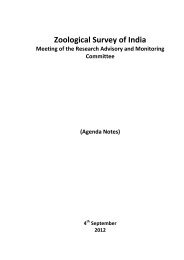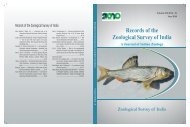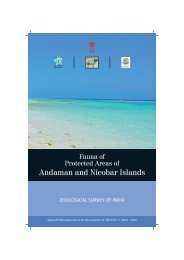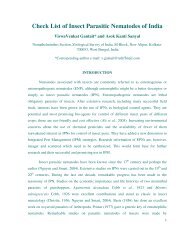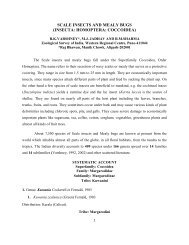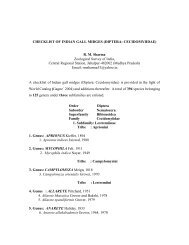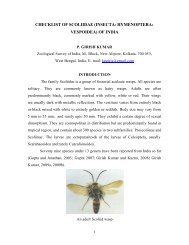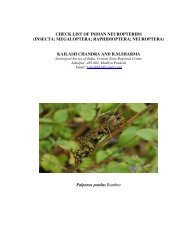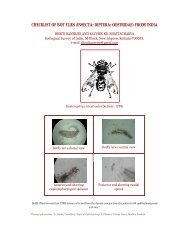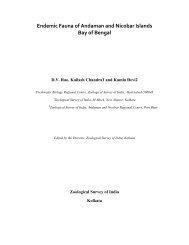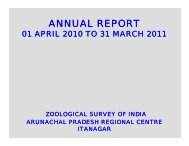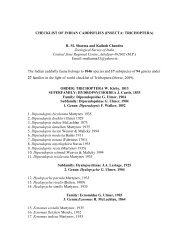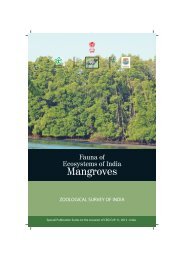Vol. 111 - Part I - Zoological Survey of India
Vol. 111 - Part I - Zoological Survey of India
Vol. 111 - Part I - Zoological Survey of India
You also want an ePaper? Increase the reach of your titles
YUMPU automatically turns print PDFs into web optimized ePapers that Google loves.
Rec. zool. Surv. <strong>India</strong> : <strong>111</strong>(<strong>Part</strong>–1) : 5-9, 2011<br />
REMARKS ON LAMARCKIAN CONCEPT OF ANIMAL<br />
EVOLUTION AND PHILOSOPHY OF BIOLOGY<br />
TRIDIB RANJAN MITRA<br />
<strong>Zoological</strong> <strong>Survey</strong> <strong>of</strong> <strong>India</strong>, M-Block, New Alipore, Kolkata-700053<br />
“Lamarck would be astonished to know that<br />
‘Lamarckism’ has come to mean the inheritance <strong>of</strong><br />
acquired characters. In the first place, he did not believe<br />
that all acquired characters are heritable, and in the<br />
second place in saying that some are, he was only<br />
repeating that everyone “knew” and had “known” since<br />
antiquity” (G.G. Simpson, 1961).<br />
INTRODUCTION<br />
The publication <strong>of</strong> the theory <strong>of</strong> natural selection<br />
on the origin <strong>of</strong> species (or descent <strong>of</strong> species) brought<br />
intellectual debate on the idea <strong>of</strong> evolution. Darwinism<br />
(or the theory <strong>of</strong> natural selection) had to fight with<br />
the supporters <strong>of</strong> biblical ideas <strong>of</strong> the origin <strong>of</strong> living<br />
beings in one hand and on the other hand on the<br />
methods <strong>of</strong> origin <strong>of</strong> living ones especially with the<br />
supporters <strong>of</strong> so-called Lamarck’s ideas. Darwinism own.<br />
But Lamarckism is still maintaining its influence in some<br />
quarters <strong>of</strong> intellectual and political world; although it<br />
has been proved that several explanations on evolution<br />
usually labelled as “Lamarckism” are not valid.<br />
The object <strong>of</strong> the present article is to present what<br />
Lamarck actually said on evolution <strong>of</strong> animals and how<br />
it was interpreted from time to time and a note on the<br />
relationship between Lamarckian philosophy and<br />
modern philosophy <strong>of</strong> biology.<br />
For the above purpose I have taken help <strong>of</strong> the<br />
most popular and dependable English translation,<br />
followed by celebrated evolutionists, <strong>of</strong> Lamarck’s<br />
Philosophie Zoologique by Hugh Elliot (1914). In<br />
addition to this remarks on the subject by celebrated<br />
Zoologists have been taken into considerations. In order<br />
to present Lamarck’s words, quotations from the English<br />
translation by Elliot (1914) have been cited as and when<br />
required.<br />
LAMARCK AND EVOLUTION<br />
Some critics <strong>of</strong> Lamarck believed that he did not<br />
propose any genuine mechanism <strong>of</strong> evolutionary<br />
changes. On the contrary Simpson (1961) observed,<br />
“Lamarck (1744-1829) was, however, the first to maintain<br />
clearly and consistently that all taxa have arisen by<br />
evolution and are a phylogenetic continuum”. Mayr<br />
(1976) remarked that Lamarck’s master doctrine was that<br />
all classes <strong>of</strong> animals form a unique and graduated<br />
series from the simple to the most perfect; and Lamarck<br />
could be designated as the founder <strong>of</strong> the theory <strong>of</strong><br />
evolution. It is fact that in several pages <strong>of</strong> Philosophie<br />
Zoologique ideas on evolution are available, but<br />
Lamarck’s discussion <strong>of</strong> aquatic animals clearly indicate<br />
his ideas on evolution. He wrote :<br />
“I do not doubt that mammals originally came from<br />
the water, nor that water is the true cradle <strong>of</strong> entire<br />
animal kingdom.”<br />
“We still see, in fact, that the least perfect animals,<br />
and they are the most numerous, live only in water, as<br />
I shall hereafter mention; that is exclusively in water or<br />
very moist places that nature achieved and still achieves<br />
in favourable conditions those direct or spontaneous<br />
generations which bring into existence the most simple<br />
organized animalcules. Whence all other animals have<br />
sprung in turn” (pp. 175-176).<br />
“......After a long succession <strong>of</strong> generations those<br />
individuals, originally belonged to one species, become<br />
at length transformed into a new species distinct from<br />
the first” (pp. 38-39).<br />
From the above it appears that Elliot (1914) was<br />
right to comment.”......The most fundamental purpose<br />
<strong>of</strong> Lamarck’s <strong>Zoological</strong> work was to convert the belief<br />
in the fixity <strong>of</strong> species.” Darwin in the sixth edition <strong>of</strong><br />
his ‘Origin <strong>of</strong> Species’ (1872) in the chapter entitled,<br />
“An Historical Sketch” wrote, “In these works he



